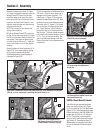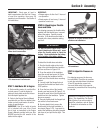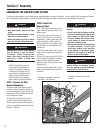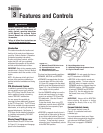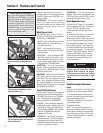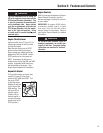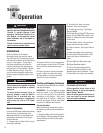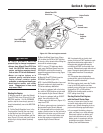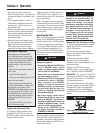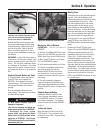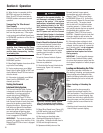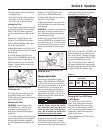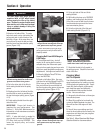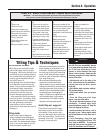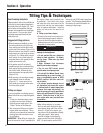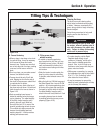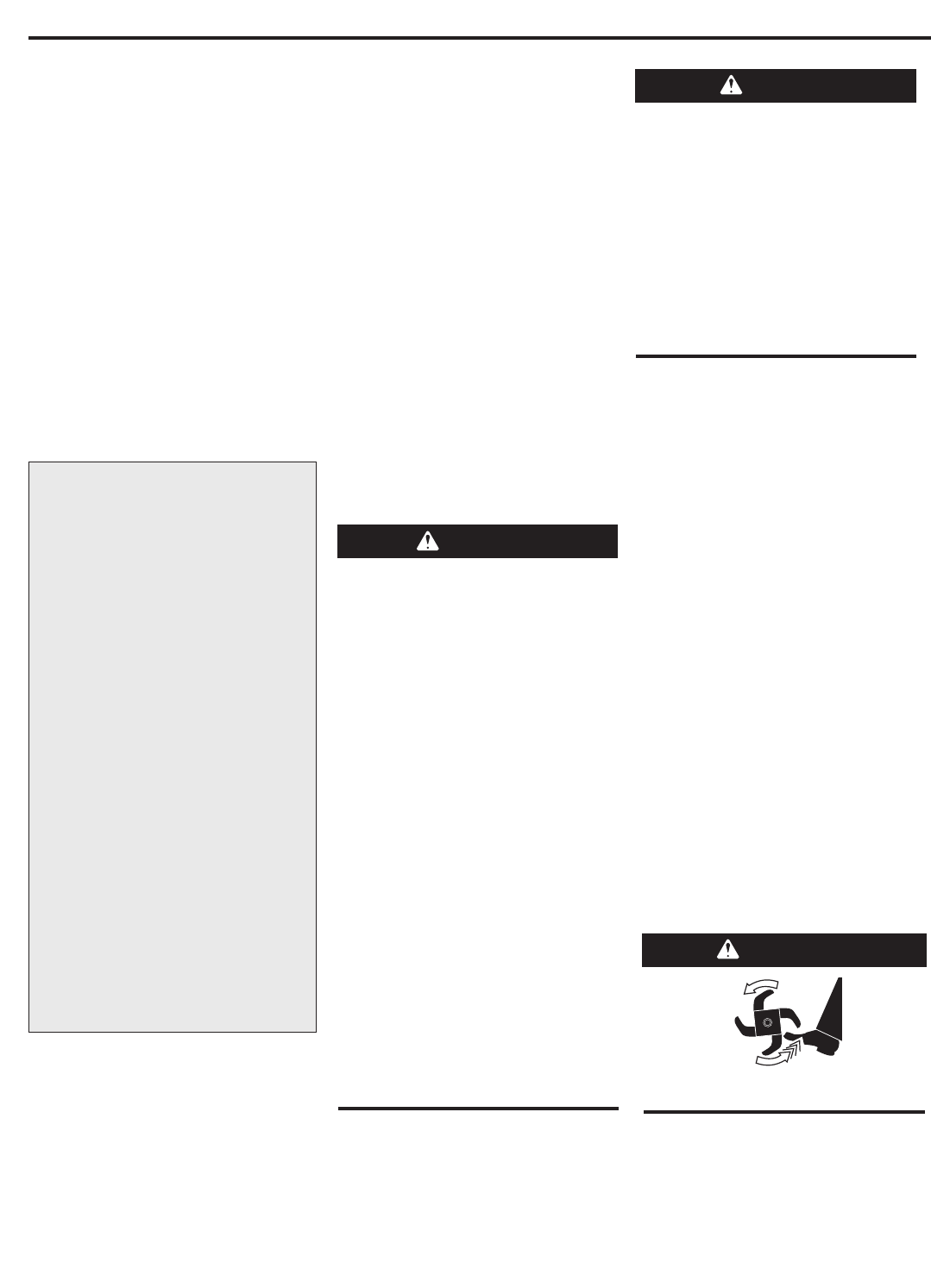
Section 4: Operation
Reconnect the cables and securely
tighten to battery posts. The engine will
recharge the battery if the battery is still
good.
• If you suspect the batter is “dead”, or
if the battery is damaged, disconnect,
and remove it. Have it checked by a
qualified technician.
• If battery has been removed, wrap cable
terminals at end of positive cable with
electrical tape and secure the cable to
the battery bracket. This will prevent
electrical discharge.
• Before pulling the recoil starter rope,
turn the keyswitch to the RUN position.
Move the Throttle Lever away from
STOP position and set the choke as
applicable. See Engine Owner’s Manual.
Stopping the Engine and Tiller
1. To stop the wheels and tines, move
the Wheels/Tines/PTO Drive Lever into
NEUTRAL position and then release both
Forward Interlock Levers.
2. Move the engine Throttle Lever to the
STOP position. Then on electric start
models, turn the key to OFF. Remove the
key for safekeeping.
NOTE: The engine may have a separate
Throttle Control Lever and ON/OFF switch
on the engine. These controls can also be
used to stop the engine. See the Engine
Owner’s manual for information specific
to your engine.
Operating the Tiller
When first practicing, keep the Tines/PTO
Clutch Lever in DISENGAGE position and
the Wheel Speed Lever in SLOW position.
The following pages provide guidelines
for using your tiller effectively and safely
in various gardening applications. Be
sure to read Tilling Tips & Techniques, in
this Section, before you actually put the
tines into the soil.
This is a traditional standard-rotating-tine
(SRT) tiller with forward rotating tines. It
operates in a completely different manner
than counter-rotating-tine (CRT) tillers, or
from front-tine tillers.
Moving the Tiller Forward and Tilling
1. Start the engine and gradually increase
engine speed to FAST (see
Starting the
Engine, this Section).
2. Test the Forward Interlock Safety
System. See Testing Forward Interlock
System, this Section.
3. When practicing, set the Depth
Regulator Lever to Travel position.
Otherwise, set the Depth Regulator Lever
to a desired depth.
4. Move Tines/PTO Clutch Lever to
ENGAGE position if you want the tines to
turn. If practicing, leave in DISENGAGE.
IMPORTANT: Do not move Tines/PTO
Clutch Lever to ENGAGE unless Wheels/
Tines/PTO Drive Lever is in NEUTRAL.
Tiller damage may occur!
5. To move the tiller forward and engage
the tines, squeeze and hold either Forward
Interlock Lever (Figure 4-3) against the
handlebar grip, then move the Wheels/
Tines/PTO Drive Lever down to FORWARD
position.
To avoid serious personal injury or
damage to equipment:
• Always place Wheels/Tines/PTO Drive
Lever in NEUTRAL before starting
engine, and before engaging wheels,
tines or other PTO attachments.
• Be sure there are no obstacles behind
you before moving in reverse.
• Wheels/Tines/PTO Drive Lever should
automatically return to NEUTRAL
when released from REVERSE
position. If it does not, move lever to
NEUTRAL manually and discontinue
use until you adjust the lever. See
Section 5, Checking and Adjusting
Reverse Drive System.
• No reverse motion should occur if
Wheels/Tines/PTO Drive Lever is not
held up in REVERSE. See Section 5,
Checking and Adjusting Reverse Drive
System for adjustment steps. Do not
use tiller unless properly adjusted.
• Always return to NEUTRAL and let
all motion stop before shifting to
FORWARD or REVERSE.
CAUTION
The Forward Interlock Safety System is
designed for the operator’s safety. Do
not disconnect or attempt to defeat the
purpose of the system. If the system
malfunctions, immediately contact your
local authorized dealer or the TROY-
BILT Technical Service Department for
assistance. Do not use the tiller or
the PTO power unit until the Forward
Interlock Safety System is functioning
properly. Always test the system before
using the tiller or PTO power unit.
DANGER
Keep away from rotating tines. Rotating
tines will cause injury.
WARNING
WARNING
KEEP AWAY FROM ROTATING TINES.
ROTATING TINES WILL CAUSE INJURY.
Cold Weather Operation
When temperatures fall below 40
o
F,
do the following steps to protect your
engine and transmission from damage:
1. Refer to the Engine Owner’s Manual
for motor oil specifications for cold
weather operation. Use winter blend
gasoline.
2. Warm up the engine before putting it
under a load.
3. Use winter-blend gasoline.
4. Use the correct weight gear oil in PTO
Power Unit transmission.
5. Warm up the transmission gear oil
as follows: With engine running, move
Wheel Speed Lever (Figure 4-2) to
FREEWHEEL (then block wheels so they
can’t roll), put Tines/PTO Clutch Lever
into DISENGAGE, then squeeze one of
the Forward Interlock Levers and shift
the Wheels/Tines/PTO Drive Lever to
FORWARD.
6. If wheels are frozen to the ground,
melt ice with warm water.
16



